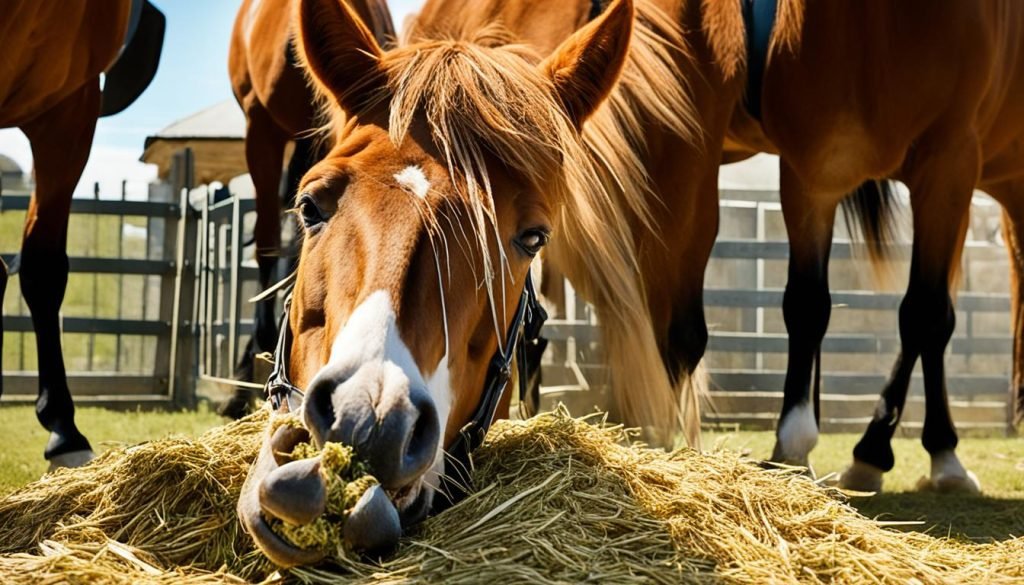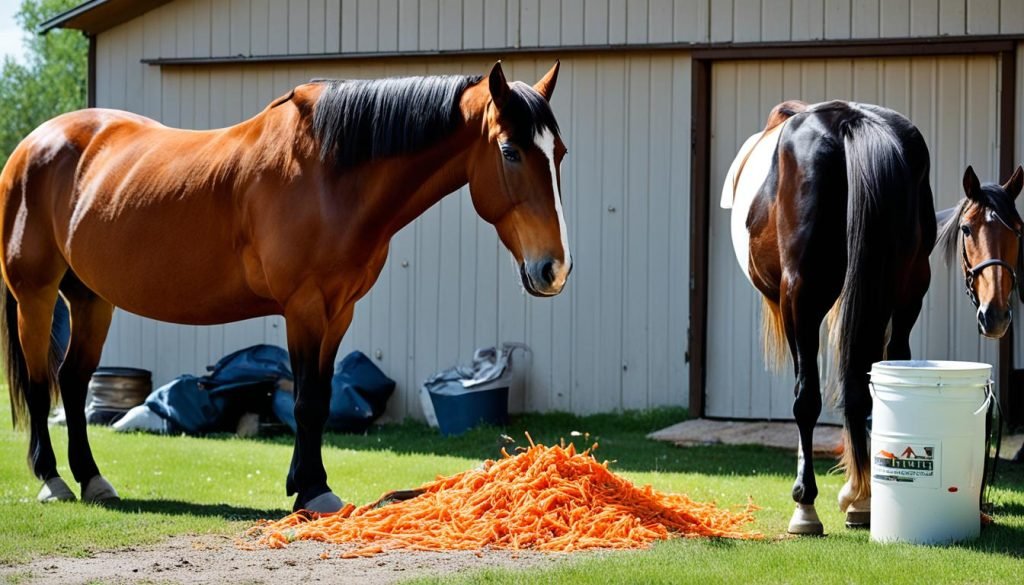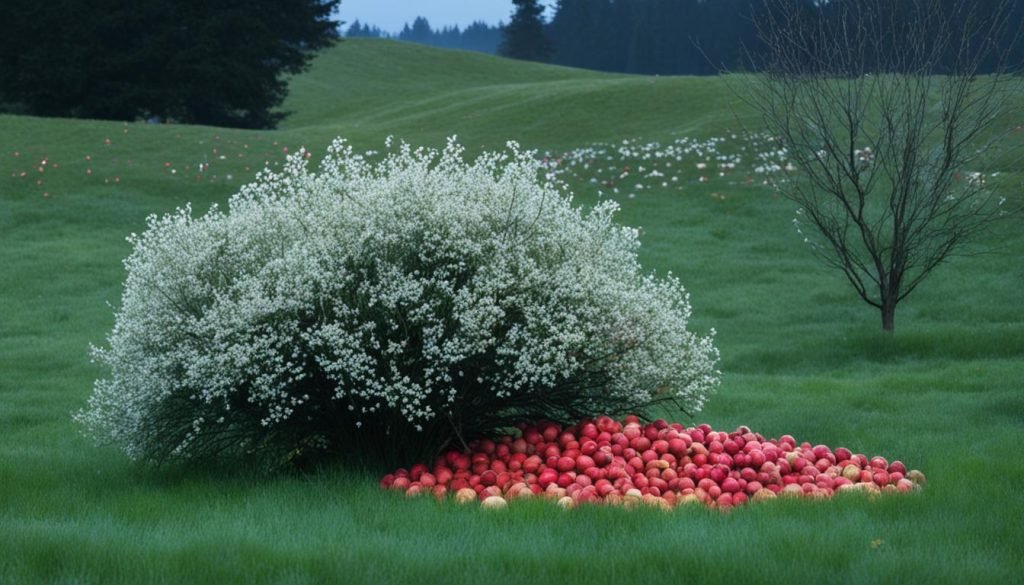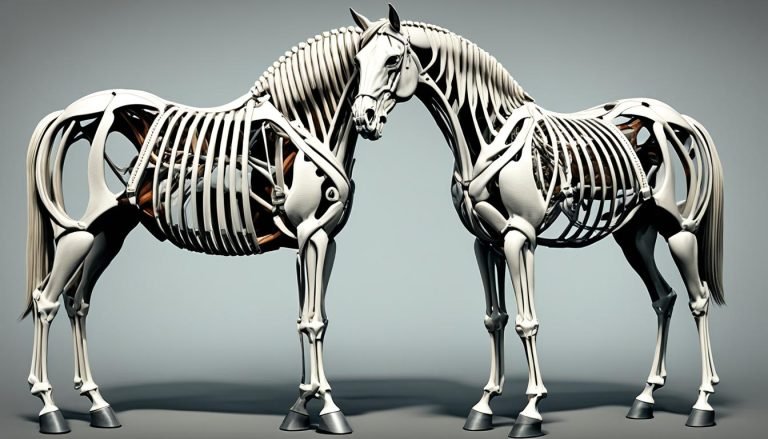Do Horses Eat Other Horses? Equine Diet Explained
Have you ever wondered about the eating habits of horses? As an equestrian enthusiast, horses hold a special place in my heart. Their gentle nature, strength, and graceful movements never fail to captivate me.
But I must admit, there have been moments when curiosity has struck, and I found myself pondering a fascinating question: do horses eat other horses?
Let’s dive into the world of equine diet and explore the eating habits of these magnificent creatures. While horses are known to be herbivores, there are some intriguing instances where their feeding behaviors may surprise you. Join me on this enlightening journey as we uncover the secrets of the horse’s diet.
Key Takeaways:
- Horses have a primarily herbivorous diet and are not known to eat other horses.
- However, horses may exhibit unusual feeding behaviors such as eating manure or consuming small amounts of meat.
- Understanding the reasons behind these behaviors is crucial to ensuring horses receive a balanced and nutritious diet.
- Providing horses with a well-rounded diet that includes sufficient fiber, forage, and essential nutrients is essential for their health and well-being.
- Stress, boredom, and nutrient deficiencies can also contribute to abnormal eating behaviors in horses.
Why Do Horses Eat Manure?
Eating manure, also known as coprophagy, is a behavior observed in both foals and adult horses. While it may seem unusual, there are reasons behind this behavior that are important to understand.
Horse Feeding Behavior: Foals Eating Manure
In the case of foals, eating manure is a natural and expected behavior. It serves a purpose in their development and overall health.
When foals eat manure, they are populating their digestive system with important microbes that aid in the breakdown and digestion of food. This helps establish a healthy gut flora and supports their growing immune system.
It may seem strange, but this behavior is essential for foals to develop a strong and efficient digestive system.
Horse Feeding Behavior: Adult Horses Eating Manure
For adult horses, the consumption of manure can indicate potential issues in their diet or suggest stress and boredom.
When horses are not receiving a diet that meets their nutritional needs, they may resort to eating manure as a way to supplement their diet. This behavior could be a sign that they are lacking essential nutrients.
In some cases, horses may also eat manure out of boredom or to alleviate stress. Horses are natural grazers and require constant access to forage. When they are confined or have limited access to forage, they may exhibit abnormal eating behaviors, such as consuming manure.
Ensuring a Balanced Horse Diet
To prevent horses from eating manure, it is important to provide them with a diet that meets their nutritional needs. This includes ensuring they have access to adequate forage throughout the day.
By offering a diverse range of forage options, such as hay or pasture, horses are less likely to resort to eating manure. Additionally, providing environmental enrichment and opportunities for exercise can help alleviate stress and prevent the development of boredom-related behaviors.
Can Horses Eat Meat?
While horses are primarily herbivorous animals, there have been instances where horses have been observed eating small amounts of meat. This behavior is considered to be opportunistic rather than a normal part of their diet. Horses may consume meat or animal products if they come across them, but it is not their natural preference or requirement. Their digestive system is adapted for processing plant matter, and a balanced diet should primarily consist of forage and other plant-based feeds.
Although carnivorous behavior in horses is uncommon, there have been reports of horses showing interest in consuming meat under certain circumstances. However, it is important to note that such instances are rare, and this behavior should not be encouraged or considered a normal part of a horse’s diet.
“While horses are mostly herbivores, it’s important to remember that they are opportunistic feeders with a flexible dietary behavior.”
– Dr. Jane Wilson, Equine Nutrition Expert-
Horses have a unique digestive system that is optimized for breaking down and utilizing nutrients from fibrous plant material. Their long, complex intestines and specialized gut bacteria help them efficiently process and extract nutrients from forage-based diets.
To further understand horses’ natural feeding behavior, it’s essential to explore their evolutionary background. Horses are descendants of small, browsing animals that roamed open grasslands and forests. This influenced their feeding habits, making them well-adapted to grazing on grasses and consuming plant matter.
While horses may occasionally show interest in tasting meat or animal products, it should be understood that their bodies are not designed to process or digest such foods effectively. A horse’s digestive tract lacks the necessary enzymes and stomach acidity to efficiently break down and absorb nutrients from meat-based diets.
Horses’ Digestive System and Plant-Based Diet
To better understand why horses are primarily herbivores, let’s take a look at their unique digestive system:
| Digestive System | Importance |
|---|---|
| Cecum | Large fermentation chamber where fiber is broken down by bacteria and other microorganisms. |
| Small Intestine | Absorbs nutrients from digested plant matter. |
| Stomach | Small stomach that secretes limited amounts of acid, primarily for digestion of fibrous feeds. |
| Salivary Glands | Produce saliva that aids in the initial breakdown of plant material. |
| Large Colon | Site of extensive fermentation where fiber degradation and absorption of volatile fatty acids occur. |
As herbivores, horses have evolved to consume plant-based feeds that provide the necessary nutrients, fiber, and energy required for their daily activities. Their digestive system is specifically designed to extract nutrition from grasses, hay, and other plant materials.
It’s worth noting that the occasional consumption of small amounts of meat should not be considered a significant part of a horse’s diet. Providing horses with a well-balanced, nutritionally complete diet consisting of high-quality forage, supplemented with concentrates if necessary, is crucial for their overall health and well-being.
Image: A horse grazing on grass, showcasing its natural herbivorous feeding behavior.
Factors Influencing Horse Eating Habits
Several factors can influence a horse’s eating habits. These include the availability of forage, the quality of the diet, and the horse’s natural grazing behavior. Horses require a significant amount of fiber in their diet, and a lack of roughage can lead to abnormal behaviors such as eating manure. Feeding high-starch diets or grazing on young, low-fiber pasture can also affect a horse’s eating habits. It is important to provide horses with a balanced diet that meets their nutritional needs and supports their natural feeding behavior.
The Importance of Fiber Intake
Horses have a unique digestive system that relies on a high-fiber diet to function properly. Fiber is essential for maintaining healthy gut motility and preventing digestive issues. Without sufficient fiber intake, horses are more likely to develop problems such as colic, ulcers, and hindgut acidosis. These conditions can cause discomfort and affect a horse’s overall well-being.
Fiber also plays a crucial role in satiety and weight management. It takes longer for horses to chew and digest fibrous feeds, which helps keep them feeling full for longer periods. This can prevent overeating and obesity, which are common concerns in domesticated horses.
The Dangers of High-Starch Diets
While fiber is important, it’s also essential to pay attention to the starch content in a horse’s diet. Starch is a type of carbohydrate found in grains and concentrates like pelleted feed. Excessive starch intake can lead to issues such as gastric ulcers, laminitis, and metabolic disorders like equine metabolic syndrome (EMS).
Horses that are fed high-starch diets may also exhibit behavioral changes, such as restlessness or excitability. This can make them harder to handle and may affect their overall performance and temperament.
Grazing Behavior and Pasture Management
Horses are natural grazers, and their feeding behavior is closely tied to their instinct to forage. In the wild, horses would spend most of their day grazing on a diverse range of grasses, herbs, and other forage plants. However, domesticated horses often have limited access to pasture, which can impact their eating habits.
When horses are kept on sparse or overgrazed pastures, they may resort to alternative feeding behaviors, such as eating manure or chewing on fences and trees. This is a sign of dissatisfaction and can lead to nutrient imbalances and health issues.
| Factor | Effect on Horse Eating Habits |
|---|---|
| Availability of Forage | Insufficient forage can lead to abnormal behaviors like coprophagy (eating manure) and wood chewing. |
| Quality of Diet | A balanced diet that includes adequate fiber and avoids excessive starch is crucial for proper digestive function and overall health. |
| Grazing Behavior | Access to ample, well-maintained pasture is essential to support a horse’s natural grazing behavior and prevent negative behavioral patterns. |
Nutrient Deficiencies and Horse Eating Behavior

Nutrient deficiencies can have an impact on horse eating behavior, particularly when it comes to protein, vitamins, and minerals. Although these deficiencies are relatively rare in well-balanced horse diets, they can lead to abnormal eating behaviors if not addressed.
Protein deficiency in horses can result in decreased appetite, muscle wasting, and reduced overall health. Protein is essential for muscle development, tissue repair, and the production of enzymes and hormones. Horses need an adequate amount of crude protein in their diet to support these crucial functions.
Vitamin and mineral deficiencies can also affect a horse’s eating behavior. Lack of essential vitamins and minerals can result in reduced energy, poor coat quality, weakened immune system, and overall poor health. Horses require a balanced intake of vitamins and minerals to support their overall growth, metabolism, and immune function.
While most forages provide sufficient levels of crude protein, vitamins, and minerals for horses, it is essential to ensure that their diet includes a variety of forage sources and is balanced to meet their specific nutritional needs. Depending solely on a single forage source or over-reliance on concentrates can increase the risk of nutrient deficiencies.
To illustrate the importance of a balanced diet, here is a table highlighting some key nutrients and their functions:
| Nutrient | Function |
|---|---|
| Protein | Supports muscle development, tissue repair, and hormone production |
| Vitamin A | Essential for vision, immune function, and growth |
| Vitamin E | Acts as an antioxidant, important for muscle function and immune system |
| Calcium | Essential for bone health, nerve function, and muscle contraction |
| Zinc | Involved in immune function, protein synthesis, and wound healing |
By providing horses with a well-rounded diet that includes a variety of forages, concentrates, and supplements if necessary, horse owners can help prevent nutrient deficiencies and ensure optimal eating behavior and overall health.
Stress and Boredom in Horse Eating Behavior
Stress and boredom can have a significant impact on a horse’s eating behavior. When horses are confined to stalls or paddocks for extended periods, they can develop vices or stereotypies as a result of stress or boredom. These behaviors may include cribbing (biting or grasping onto objects) or wood chewing. Not only can these behaviors be destructive to the horse’s environment, but they can also disrupt their normal eating habits.
One contributing factor to stress and boredom in horses is a lack of physical and mental stimulation. Horses are naturally social animals and require ample turnout time to interact with other horses and exhibit natural behaviors. Additionally, restricted access to pasture and limited forage availability can contribute to boredom and frustration, leading to abnormal eating behaviors.
To alleviate stress and boredom in horses and promote healthier eating habits, it is crucial to provide them with a stimulating environment. Here are some suggestions:
- Ensure horses have regular turnout time in a safely fenced pasture where they can socialize with other horses and engage in natural behaviors such as grazing and playing.
- Provide horses with companionship. Horses are herd animals and thrive in the company of other horses. If a horse is stabled alone, consider introducing a compatible companion.
- Offer environmental enrichment, such as stable toys, treat balls, or hanging forage nets, to provide mental stimulation and mimic natural foraging behaviors.
- Vary the horse’s routine and provide regular exercise. Incorporate different activities into their daily schedule, such as trail rides, lunging, or groundwork.
- Ensure a consistent and balanced diet that meets the horse’s nutritional needs. A diet rich in fiber and appropriate forage can help keep horses occupied and satisfied.
By addressing stress and boredom in horses, owners can help create a conducive environment for healthy eating habits. This, in turn, promotes overall well-being and reduces the likelihood of abnormal behaviors such as consuming manure or engaging in destructive habits.
Unusual Items Consumed by Horses

Horses have fascinating eating habits and are known to consume a variety of unusual items. While their primary diet consists of grass, hay, and grains, horses sometimes display a penchant for more unconventional snacks.
Imagine a horse nibbling on dandelions or even sampling a sandwich!
These strange horse diets can make us question their taste preferences and lead to amusing anecdotes. Here are some examples of the unusual items that horses have been known to eat:
Dandelions and Thistles
Horses have been known to graze on dandelions and thistles, even though these plants are typically considered weeds. While these plants may not be harmful in small quantities, it’s important to ensure that horses have access to a varied and nutritious diet that doesn’t solely consist of these wild plants.
Wood and Bark
Some horses have a peculiar fondness for chewing on wood and bark from certain trees. This behavior, known as wood-chewing, can be harmful if horses consume large amounts of wood, leading to dental issues or ingestion of toxic substances.
Cigarettes and Sandwiches
“Wait, did you say cigarettes and sandwiches?”
Yes, you read that correctly! There have been instances where horses, curious creatures that they are, have been caught munching on cigarettes or even devouring sandwiches left unattended.
While these peculiar dietary choices may seem entertaining, it is crucial to remember that not all items consumed by horses are safe or healthy for them.
Here’s an image showcasing the diverse items horses have been known to consume:
Horse owners and caretakers need to be aware of unusual feeding behaviors and ensure that horses have access to a safe and appropriate diet. Monitoring their eating habits and ensuring they don’t consume harmful substances is vital for their well-being.
Potential Treats for Horses
When it comes to rewarding your beloved equines or simply offering them a tasty snack, there are several safe and suitable treats that you can include in their diet. It’s important to remember that treats should be given in moderation and should not replace a balanced and nutritious diet. Here are some popular options for horse treats:
1. Carrots
Carrots are a classic favorite among horses. They are not only delicious but also provide essential nutrients like beta-carotene, which can support overall health and well-being.
2. Apples
Apples are another popular choice for horse treats. Not only are they tasty, but they also contain vitamins and minerals that can contribute to your horse’s nutritional needs.
3. Grapes
Grapes can be a refreshing and sweet treat for horses. However, it’s important to remove the seeds before feeding them to your equine friend, as they can pose a choking hazard.
4. Bananas
Many horses enjoy the sweet taste and soft texture of bananas. They are a good source of potassium and can be a nutritious addition to your horse’s diet.
5. Peas and Green Beans
Peas and green beans are safe and healthy options that can provide a crunchy and fiber-rich treat for horses. These vegetables can be fed in limited quantities as a special treat.
6. Lettuce
Lettuce leaves can be offered as a low-calorie treat for horses. They provide a hydrating crunch and can be a healthy alternative to sugary snacks.
7. Dried Beans
Some horse owners feed dried beans, such as chickpeas or lentils, as treats. These legumes are a good source of protein and fiber, but they should be fed sparingly due to their high carbohydrate content.
8. Grains and Cereals
In addition to fruits and vegetables, horses can enjoy small amounts of grains and cereals as treats. Some common options include oats, barley, and bran. However, it’s important to consider any dietary restrictions or health issues that your horse may have before offering these treats.
Remember, the key to feeding treats is moderation. Offering a small portion of these treats occasionally can add variety to your horse’s diet and create a positive bonding experience. Always consult with your veterinarian or equine nutritionist to ensure that the treats you choose are appropriate for your horse’s specific needs.
| Treat | Description | Nutritional Benefits |
|---|---|---|
| Carrots | Crunchy and sweet root vegetable | Source of beta-carotene and fiber |
| Apples | Crunchy and juicy fruit | Source of vitamins and minerals |
| Grapes | Small, refreshing fruits | Contain antioxidants and natural sugars |
| Bananas | Soft and sweet fruit | Good source of potassium |
| Peas and Green Beans | Crunchy, fiber-rich vegetables | Provide vitamins and minerals |
| Lettuce | Leafy green with a crisp texture | Hydrating and low in calories |
| Dried Beans | Legumes such as chickpeas or lentils | Source of protein and fiber |
| Grains and Cereals | Oats, barley, and bran | Energy source with additional nutrients |
Foods to Avoid for Horses

When it comes to feeding horses, it’s important to be aware of certain foods that can be toxic or pose health risks. By avoiding these harmful horse foods, you can ensure the well-being of your equine companion. Here are some foods that should be kept off your horse’s menu:
Plants
Several plants can be toxic to horses if ingested. These include:
- Lily of the Valley
- Larkspur
- Tomato or potato plants
- Rhubarb leaves and roots
- Poison hemlock
- Foxglove
- And various other plants
It’s important to keep your horse away from these plants and ensure that they do not have access to them in their grazing areas.
Other Substances
In addition to plants, other substances can be harmful to horses if consumed. These include:
- Chocolate
- Caffeine
- Alcohol
- Certain medications
It’s crucial to keep these substances out of your horse’s reach and to store them securely to prevent accidental ingestion.
By being aware of these foods and substances that can be toxic to horses, you can help keep your equine friend safe and healthy. Always consult with a veterinarian if you suspect your horse has ingested something harmful.
Foods to Avoid for Horses
| Plants | Other Substances |
|---|---|
| Lily of the valley | Chocolate |
| Larkspur | Caffeine |
| Tomato or potato plants | Alcohol |
| Rhubarb leaves and roots | Certain medications |
| Poison hemlock | |
| Foxglove | |
| Various other plants |
Weird Horse Nutrition Through History
Throughout history, horses have been fed in various unconventional ways, reflecting the diverse cultural practices and dietary preferences in different regions. These unique horse diets and unconventional horse-feeding practices offer an interesting glimpse into the historical interactions between humans and horses.
European Silage Feeding
“Feeding silage to horses was a popular practice in Europe during the 19th century. Silage, made from fermented grass or corn, provided a rich source of nutrients for horses during the winter months when fresh forage was scarce. It was a cost-effective way to ensure that horses received sufficient food to maintain their weight and health.”
Saudi Arabian Dried Fava Beans
“In the Arabian Peninsula, dried fava beans were often included in the diet of horses. These beans provided a concentrated source of protein, energy, and essential nutrients, making them a valuable feed for horses in the desert environment. This unconventional feeding practice showcased the resourcefulness of horse owners in catering to the nutritional needs of their animals.”
Irish Horses and Weekly Pints of Ale or Stout
“In Ireland, it was not uncommon for horses to receive a weekly pint of ale or stout as part of their diet. While this may seem peculiar, it was believed to improve their coat condition and overall well-being. However, it is essential to note that alcohol consumption can have adverse effects on horses, and this practice has become less common in modern times.”
These examples highlight the various ways in which horses have been fed throughout history, incorporating local traditions, available resources, and the nutritional needs of these magnificent animals. While some unconventional feeding practices may seem strange by today’s standards, they offer valuable insights into the historical relationship between humans and horses.
| Unconventional Horse Feeding Practices | Region | Description |
|---|---|---|
| European Silage Feeding | Europe | Feeding horses a weekly pint of ale or stout, was once believed to improve coat condition and overall well-being. |
| Saudi Arabian Dried Fava Beans | Saudi Arabia | Including dried fava beans in the diet of horses as a concentrated source of protein and energy in desert environments. |
| Irish Horses and Weekly Pints of Ale or Stout | Ireland | Feeding horses a weekly pint of ale or stout, once believed to improve coat condition and overall well-being. |
Final Thoughts
Horses are naturally herbivorous animals, with eating habits and digestive systems that are adapted for processing plant-based feeds. While there may be instances of horses exhibiting unusual eating behaviors, such as eating manure or consuming small amounts of meat, these behaviors are not typical or necessary for their overall diet.
To ensure the health and well-being of horses, horse owners must provide a balanced and nutritious diet that meets their specific nutritional needs. This includes providing ample access to quality forage and considering the fiber, protein, and vitamin and mineral content of their feed. By understanding and accommodating their natural equine feeding behavior, horse owners can help maintain the overall health and happiness of their horses.
In summary, while horses may exhibit occasional unusual eating behaviors, their primary diet should consist of natural plant-based feeds. Providing them with a well-balanced diet, adequate fiber intake, and appropriate treats in moderation is essential for maintaining their optimal health and ensuring their longevity.
More About Horses
- Equine Self-Defense: How Do Horses Defend Themselves?
- What Do Horses Need To Survive in The Wild?
- Do Horses Have Predators? Natural Equine Predators
- Do Horses Eat Humans? Myth or Reality
- Do Horses Hibernate in Winter? Equine Myths Debunked
- Do Horses Eat Other Horses? Equine Diet Explained
- Wild Horses’ Nocturnal Habits Unveiled
- Wild Horses Daily Routine Explained
- How Do Horses Communicate with Each Other?
- Where Do Wild Horses Sleep?
- Global Horse Population: How Many Horses Exist in the World
- Horses and Water: Can Horses Swim Naturally?
FAQ
Do horses eat other horses?
No, horses are herbivorous animals and do not eat other horses.
Why do horses eat manure?
Horses may eat manure to populate their digestive system with essential microbes and stimulate their immune system. However, for adult horses, it could indicate problems in their diet or stress and boredom.
Can horses eat meat?
While horses are primarily herbivorous, there have been instances where horses have been observed eating small amounts of meat. However, this behavior is considered opportunistic rather than a normal part of their diet.
What factors influence horse eating habits?
The availability of forage, the quality of the diet, and the horse’s natural grazing behavior can all influence a horse’s eating habits.
Can nutrient deficiencies affect horse eating behavior?
Nutrient deficiencies, particularly in protein, can occasionally lead to abnormal eating behavior in horses. However, these deficiencies are rare, as most forages provide sufficient crude protein for horses.
How does stress and boredom affect horse eating behavior?
Stress and boredom can contribute to abnormal eating behavior in horses, including the consumption of manure. Providing horses with ample turnout, social interaction, and enrichment activities can help alleviate these issues.
What unusual items do horses consume?
Horses have been known to consume various items such as dandelions, thistles, wood/bark of certain trees, and even non-food items like cigarettes or sandwiches. It is important to ensure they have access to a safe and appropriate diet.
What treats are suitable for horses?
Safe treats for horses include carrots, apples, grapes, bananas, peas, green beans, lettuce, dried beans, and various types of grains and cereals. Treats should be given in moderation and consider any dietary restrictions or health issues the horse may have.
What foods should be avoided when feeding horses?
Horses should avoid consuming foods such as lily of the valley, larkspur, tomato or potato plants, rhubarb leaves and roots, poison hemlock, foxglove, chocolate, caffeine, alcohol, certain medications, and various other plants. These can be toxic or pose health risks to horses.
What are some unconventional horse feeding practices throughout history?
Throughout history, there have been various unconventional feeding practices for horses, such as feeding horses silage in Europe, dried fava beans in Saudi Arabia, and weekly pints of ale or stout for Irish horses. Different cultures and regions have different traditions and dietary preferences for horses.
What is the conclusion about horse eating habits?
Horses are primarily herbivorous animals with behaviors and digestive systems adapted for processing plant-based feeds. While there may be instances of horses exhibiting unusual eating behaviors, it is important to provide a balanced and nutritious diet that meets their specific needs.







